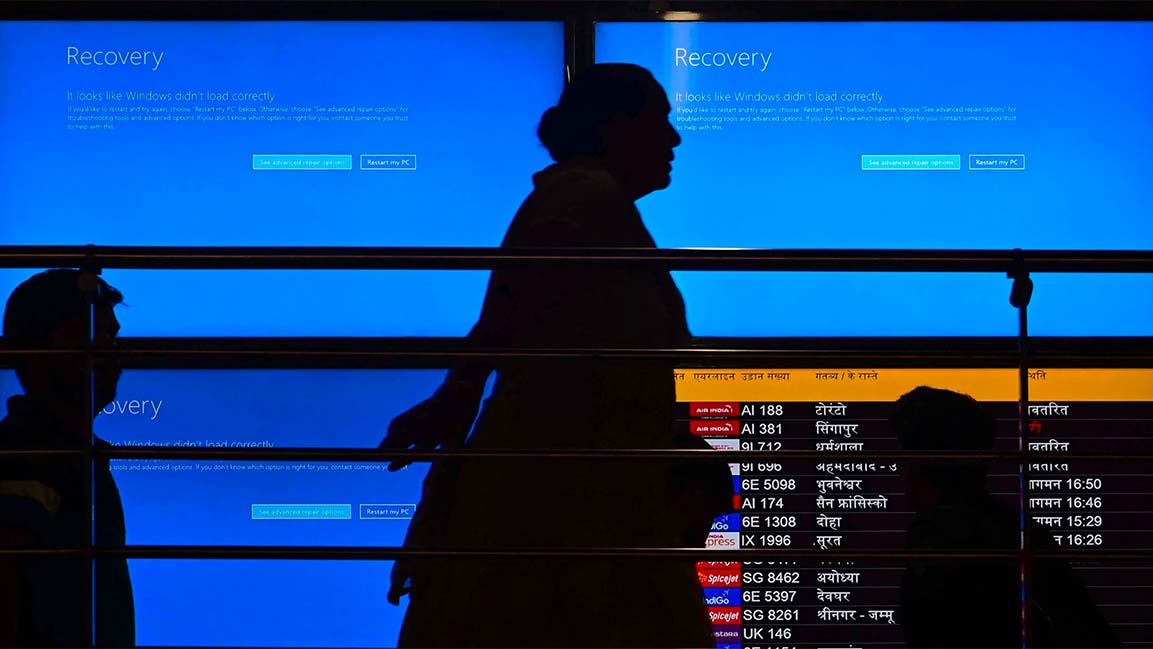- | 9:00 am
Cloudy with a chance of data centers. Is our digital life fueling this boom in the Middle East?
Cloud adoption, 5G rollout and real-time data analytics are creating greater opportunities for tech giants, like Amazon, Microsoft, Google and Oracle, to build data centers in the region

The shift to work and play from home and the digital economy, hastened by the pandemic, have generated one surprising bright spot for the Middle East – data centers. Data is an intangible asset, but it has to be stored physically in sprawling warehouse-style buildings.
Businesses are gobbling up and generating data in an increasingly connected world, spurring them to re-evaluate where and how they house their central nervous systems. Across various sectors, such as finance, retail, and healthcare, enterprises are rethinking their information technology to hedge against data breaches, creating greater opportunities for data centers to boost cyber resilience.
Businesses using cloud services to manage their operations without buying, maintaining, and updating hardware and software are also fueling the demand for space in data centers.
While many companies had been moving into cloud-based services before, the pandemic forced them to move to the cloud faster.
“Cloud adoption in the Middle East has moved from aversion to adoption in just two years post-pandemic. It is increasingly becoming a foundational platform for digital innovation for 70% of organizations,” said Harish Dunakhe, Research Director, Software and Cloud, META IDC.
IDC expects the competition in the cloud market to intensify. And increased cloud computing means more data centers – many cloud service providers want to have outposts near their clients’ servers.
Big tech players that provide data storage are preparing for even greater demand as 5G becomes more widely used in the region. The rollout of 5G networks is expected to stimulate more computing and data storage on a gigantic scale. And a large percentage of that will need to be stored in data centers.
In addition, the increasing adoption of sophisticated data analytics aided by artificial intelligence requires more computing power, which also takes up physical space.
Online shopping, distributed workforces, acceleration of smart cities, and the need for real-time data analytics are layering into the momentum of data center growth, as enterprises demand more safe space for their data.
At the same time, increasing operational business requirements are prompting enterprises to migrate from on-premises server room operations to data center services, including managed, colocation, and hybrid facilities.
Pushing towards a fully digitalized society, various government initiatives across the region, such as Kuwait Vision 2035, Saudi Vision 2030, UAE Vision 2021, and Bahrain’s cloud-first, reinforce how promising the region’s data center landscape is.
THE MIGHTY ONES FLOCK TO GULF
It’s not surprising that the Middle East and Africa data center market witnessed investments of $6.55 billion in 2021 and will see investments of $12.19 billion by 2027.
Investors have taken note. The tech titans are expected to spend over $2 billion in data center services in the UAE.
There’s a rush among hyperscalers – Amazon, Microsoft, Google, IBM, and Oracle – to gain market share and enable enterprises to outsource IT functions to large, off-site data centers.
Amazon Web Services (AWS), which caught many established tech giants sleeping as it boomed in the cloud computing market, invested in its first Mideast data center in Bahrain, and is all set to open three more in the UAE this year. It has joined forces with various stakeholders, including Abu Dhabi Investment Office, to roll out its data facilities and launched three availability zones in Bahrain.
Not to be left behind, Google will be deploying and operating, with state-owned Saudi Aramco, a cloud region in Dammam. Another one is planned in Qatar.
Competitors, including Microsoft and Oracle, are also coming hard after Amazon. Microsoft opened two data centers in the UAE; Oracle opened an underground cloud region that includes two data centers in Abu Dhabi. It is the second cloud region of the Texas-based company in the UAE and its third in the Middle East. Oracle, which opened a cloud region in Jeddah, plans to launch a cloud region in Saudi Arabia’s futuristic city Neom. Alibaba already has a data center in Dubai, and IBM has data repositories in the UAE.
“It’s exciting and shows that the region is being taken very seriously for its innovation potential. We have a rapidly growing startup/scale-up scene and world-class entrepreneurial intelligence solving complex problems, and the fact that the big tech players are putting significant investment into setting up regional data centers is testament to the hard work of the region’s tech minds,” said Dina Mohammad-Laity, an independent data strategy advisor and former Director of Data Science at Talabat.
NERVE CENTER OF THE DIGITAL INFRASTRUCTURE
Evidently, the Middle East is a “priority region” for tech players as they make significant investments to enhance their infrastructure. Emerging as a nerve center of the digital infrastructure, it connects people and businesses, and the rest of the world.
“In recent years, there has been a definite trend towards hyperscalers, including Microsoft, Oracle, Alibaba, and Google Cloud, establishing dedicated cloud data centers in the Middle East. AWS has expressed intentions of establishing its cloud data center in the region this year,” said Maroun Hashem, Senior Manager, Cloud, and Alliances, Middle East, Africa, Pakistan & Turkey at Barracuda, a company that recently announced a cloud-to-cloud backup solution for customers in the UAE from an in-country data center.
For regional businesses, there is clear value to these developments. Data centers are the heart of IT infrastructure in banks, energy, transport, and health. Every industry relies on fast and secure applications that a modern data center can provide today.
Storage providers, such as AWS, try to make leasing as easy as possible by offering flexible size and payment options. You can go to the cloud and swipe your credit card and have data center space on demand.
“Customers can leverage Infrastructure and as Service (IaaS) and Platform as a Service (PaaS) offerings, while making it possible for other solution as a service (SaaS) providers to make their cloud offerings available via regional availability zones,” said Hashem.
STARTUPS STAND TO BENEFIT
The more data a company will analyze, the more it will need to invest in servers and storage space. Businesses of all sizes, public and private enterprises, startups, and educational institutions, are taking advantage of the data centers and the flexibility and connectivity to scale their businesses.
It’s cheaper to lease space in a data center that houses multiple companies under one roof.
For example, Dubai-based startup Digiteam offers its sales digitization and gamification mobile solution on the cloud and scales to new customers across different markets. Similarly, Norbloc, a technology provider behind the UAE KYC Blockchain ecosystem, facilitates faster and more secure onboarding and exchange of customer information used by the largest financial institutions in the country.
With 90% of companies joining the digitization bandwagon in the region, there’s a massive requirement to keep data in a safe environment, and these hyperscalers are paving the way for enterprises to migrate applications and workloads to the cloud while complying with local regulations requiring specific data to be kept in-country.
“Having a data center ‘zone’ in-country is a compliance requirement for the most sensitive data types. As policy evolves along with users’ expectations of how their data is handled, data security is a must-have rather than a nice-to-have, and these considerations are increasingly baked into how products are designed,” said Mohammad-Laity.
Since the governments in the region restrict data flow across borders, Hashem said, “These hyperscalers allow regional customers to back up their data within the country, a key requirement for customers operating in regulated industries and complying with local regulations.”
The general idea behind data privacy laws in the UAE and Saudi Arabia is that companies need to collect the least amount of data, track where it is located, and protect it.
“A key mandate, especially for government entities and organizations that manage sensitive customer information, has been that data remains in-country throughout its lifecycle,” added Hashem.
Meanwhile, capacity creation and capacity expansion are key trends. “With AWS announcing its data center investments for the UAE, Google creating its data center in Saudi Arabia in collaboration with Aramco, Huawei making strategic investments in the region, and with Oracle, Microsoft, and IBM already present in the region, global tech vendors will either add capacity or expand the capacity of existing data centers,” said Dunakhe.
On the innovation front, each is trying to become a unique one-stop-shop data center provider, as they invest heavily in automation, monitoring, and management solutions for real-time control over infrastructure operations. Now, signs point toward edge computing and more green, sustainable facilities and solutions.
“Conversation about green data centers, in line with global sustainability initiatives, is picking up in the region. These hyperscalers are embedding AI/ML, advanced analytics, and intelligent automation on top of their cloud-based solutions to differentiate their offerings and attract new customers,” said Dunakhe.
One thing is certain, as the region becomes a global technology powerhouse, developing an innovative digital economy, more Silicon Valley firms will plant their flags in the deserts of the Middle East to establish data centers as the industry flourishes.
“Data center industry is rapidly maturing, all driven by the innovators and entrepreneurs in the region, and it isn’t slowing down any time soon,” said Mohammad-Laity.








































